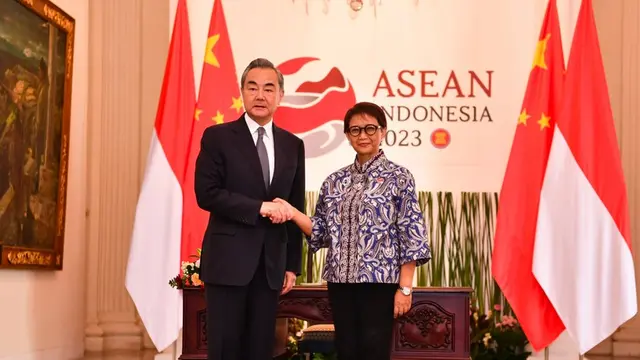Member of the Political Bureau of the Communist Party of China (CPC) Central Committee and Minister of Foreign Affairs Wang Yi's tour to Southeast Asia bodes well for prospective regional diplomacy.
With an aim of boosting strategic communication between all sides, Wang's visits to Singapore, Malaysia and Cambodia from August 10 to 13 will further strengthen long standing historical ties between China and ASEAN which date back to invitations extended to China to attend the Kuala Lumpur ASEAN Foreign Ministers' Meeting in 1991 and China becoming a full dialogue partner of ASEAN in 1996. Candid conversations on implementing sustainable regional peace architectures to prevent Southeast Asia from descending into chaos and instability is precisely what is needed.
Wang's visits are significant due to a number of reasons. Firstly, this is the first trip by Foreign Minister Wang after returning to office in July 2023. It seeks to carry the momentum from previous understandings as was the case when he attended the 13th East Asia Summit Foreign Ministers' Meeting in Jakarta, Indonesia in July as director of the Office of the Central Commission for Foreign Affairs.
The meeting resulted in an affirmation from China based on a three-point proposition, including a readiness to explore cooperation on the Global Security Initiative with other parties, upholding a fair, free, inclusive and a rules-based multilateral trading system while opposing protectionism, and China being ready to work with countries to carry forward the principles and purposes of the 1976 Treaty of Amity and Cooperation in Southeast Asia, which embodies universal principles of peaceful coexistence and friendly cooperation.
The Chinese Ministry of Foreign Affairs stated that the relationships of China with Singapore, Malaysia and Cambodia have been witnessing a sound momentum of growth. Recent developments corroborate this statement. The recently concluded subsequent negotiations on the China-Singapore Free Trade Agreement (CSFTA) which was China's first comprehensive bilateral free trade agreement with an ASEAN country that was signed in 2008, took place in 2023. The aim is to further promote and consolidate positive gains such as China making up 12.8 percent of Singapore's total merchandise trade with the world in 2022.
Similarly, Malaysia secured $555 million worth of potential exports to China during Prime Minister Anwar Ibrahim's visit to China in April, which also included the signing of trade agreements between businesses and Chinese investments in Malaysia worth approximately $38.5 billion in sectors such as the petrochemical and automotive industries.
It is also noteworthy that Foreign Minister Wang's trip to Southeast Asia coincides with the year 2023 being the 10th anniversary of the Belt and Road Initiative (BRI) of which countries such as Singapore, Malaysia and Cambodia have been an integral part of building a community with a shared future for mankind.
Cambodia, for example, has been a vocal proponent of the BRI since its inception and has benefitted from loans provided for the development of its physical infrastructure, the development and transformation of the port city of Sihanoukville and investments in key sectors such as agriculture, energy and manufacturing. As one of the least developed countries, Cambodia has chosen the BRI to ameliorate its economic challenges and to achieve its goal of becoming an upper middle-income country by 2030.Between 2009 and 2019, Cambodia reduced poverty from 34 percent to 18 percent with various Chinese projects including the BRI playing a pivotal role.
The continuity of goodwill with sound economic frameworks is the key for regional prosperity to materialize in Southeast Asia. Wang Yi's trip comes at a time when the deterrence in the Asia Pacific is being constantly threatened by the Philippines as Manila violates the Declaration on the Conduct of Parties in the South China Sea which was signed by China and members of ASEAN in 2002. The declaration affirms an unwavering commitment to freedom of navigation, peaceful settlement of disputes and exercising self-restraint in the conduct of activities. By toeing the United States' foreign policy of sowing discord and divisions in the Asia Pacific, the Philippines is essentially causing provocations in the region which is counterproductive for the joint visions that ASEAN member states and China share.
By enhancing strategic communication with ASEAN member states such as Singapore, Malaysia and Cambodia, regional stability can be achieved. According to Professor of International Relations Zhu Feng at Nanjing University, it is in the common interest of ASEAN states to ensure that potential regional conflicts are prevented from escalating.
This is precisely what Foreign Minister Wang Yi's trip to Southeast Asia aims at ensuring with regional cooperation being prioritized.
(CGTN)
 简体中文
简体中文

